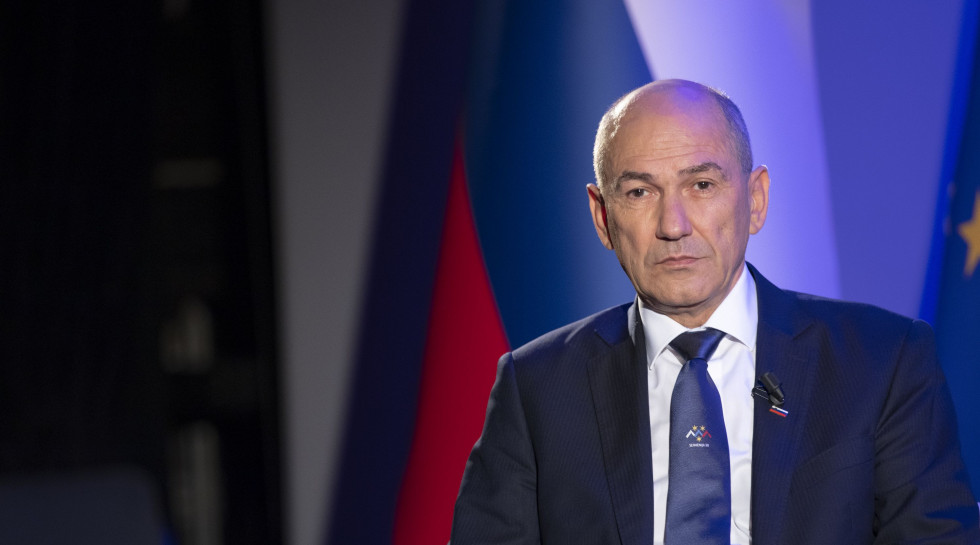By: UKOM
On Monday Prime Minister Janez Janša spoke on Televizija Slovenija about the 30th anniversary of Slovenia’s independence, preparations for the Slovenian Presidency of the Council of the EU and other current political issues.
The Prime Minister began by comparing today with 30 years ago, saying that then were equally difficult but much more fateful, unrepeatable times, and that in fact a direct comparison could not be made. On the quality of the political dialogue then and now, he said there was no difference, but that then there had been a national that was reflected in the result of the plebiscite. “If that unity had not been there, the big question would be what the final outcome of the independence process would have been, and above all, when would we have reached this step and what would have been the price.”
Regarding the level of political dialogue, the Prime Minister said that the death threats today were no different from those heard back then. “They were made mainly in Belgrade, in the ranks of the Yugoslav army, and in the ranks of those who were vocal opponents of Slovenia’s independence. Today, however, it has somehow become a kind of folklore refrain of left-wing political parties.” Janša stressed that the daily political struggle may be fierce, but when it came to national interests and key issues, such as independence at the time or, more recently, the fight against the epidemic, there was a need to stand together.
Talking about the achievements of the last 30 years, the Prime Minister pointed out that last week Slovenia was recognised as the fifth safest country in the world. “Security is one of the fundamentals. If we are threatened, as we were 30 years ago, then everything else is less important. If someone threatens your life, then you don’t think about what kind of house you are going to build and what kind of salary you are going to get.” Three weeks ago, a sustainable development survey conducted among 165 UN Member States was published. Slovenia is in the top ten in terms of its sustainable development. Despite the fact that we have some ecological problems, our beautiful natural environment has been preserved for future generations to a high level when compared to others, and this is of immense value.
The Prime Minister also touched upon the national recovery and development plan and cohesion funding, saying that the templates that had been set for the whole EU were one thing, but the fact that Member States were not on an equal footing was another. Slovenia has major delays in rail and transport infrastructure. He pointed out that hundreds of millions of euros had been invested in the digitalisation of the Slovenian healthcare system, but there were still different systems in different hospitals, including systems that could not be interconnected. This is one of the reasons that the Government has set up a Strategic Council for Digitalisation and has engaged various experts, including those who have already gone abroad. “If the action plan of the Strategic Council for Digitalisation is followed, regardless of which government will be in office, Slovenia will be digital. And have a major advantage over some other countries.
The Prime Minister went on to discuss preparations for the Slovenian Presidency of the Council of the EU and its priorities. In 2003 the European Union took a decision in Thessaloniki to guarantee the Western Balkan countries membership in the EU. They will become members when they meet the conditions. “A lot of water has passed under the bridge since the Thessaloniki decisions, and in that time it has also become clear that if the EU is not expanding, someone else is.” In his view, the EU will have to decide whether to follow the strategic objective it set itself at the outset when it comes to enlargement to the Western Balkans. A European Union free and at peace with itself, or an unfinished project with an elite club of countries that are already members.
The Prime Minister also spoke about the epidemic, facing strong opposition to the Government’s measures, freedom of expression, which overrides the freedom of the media, the Government’s decisions on the European delegated prosecutors, and the Slovenian Press Agency. On the latter, the Prime Minister said that today it was the agency that Milan Kučan had said existed to “communicate our truth to the world”. As far as the truth is concerned, the truth is neither yours nor ours, there is only one truth. According to the Prime Minister, that says it all. He also discussed planned changes to the tax laws. “Once these laws are passed, all salaries in Slovenia will be higher, without any additional burden on employers. The private sector will still be able to invest, create new jobs, employ new workers and people will have higher salaries.” He pointed out that despite the epidemic Slovenia currently has a lower unemployment rate than in 2019. As for the future, the key question in looking ahead is where Slovenians see the Slovenian flag in the next 30 years. “I see it as a modern country that will not be overtaken by those who were behind us 30 years ago. Especially because they did some things that we did not.”

